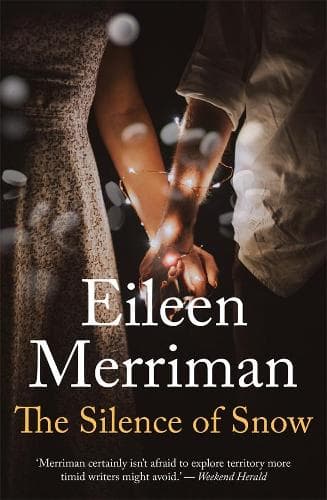The Silence of Snow
Reviewed by Dionne Christian
In four years, Eileen Merriman has published four young adult novels – three of which were finalists in the NZ Book Awards for Children and Young Adults – her first adult novel, Moonlight Sonata, which was longlisted in the Jann Medlicott Acorn Prize for Fiction at this year’s Ockham Book Awards, and now a second adult novel, The Silence of Snow. How does she do it while also working full time as a consultant haematologist at North Shore Hospital in Auckland?
I might have been slow on the uptake, but I think I’ve got it now. Like many of the world’s most successful writers, Merriman has found a potent and effective formula which she is, more or less, sticking to. If she were writing in the United Kingdom, I suspect television networks would be scrambling to adapt her books for the screen such is the twisting-turning nature of her plots and human storytelling.
It involves taking relatable characters, usually with dark secrets, and throwing a moral conundrum or two at them without any promise of a “happy ever after” ending. Indeed, the endings of the Merriman books I’ve read have been fairly bleak with just the merest glimmer of hope for the future - but for her books to finish with cliched “and they all lived happily ever afters” would be unsatisfying when she spends pages carefully building tension, layering the drama and crafting provocative stories akin to psychological thrillers.
It helps that Merriman has the background, and ability, to straightforwardly communicate a great deal of medical knowledge. This makes her books all the more rewarding even when they teeter on the melodramatic and, in the case of The Silence of Snow, the plot isn’t as original or as convincing as her previous efforts.
Here young doctor Jodi Waterstone is a first-year doctor trying to find her feet in a busy regional hospital when she happens upon Dr Rory McBride, the dashing (what else would he be?) nearly qualified anaesthetic consultant with … a dark secret. It sounds like a dozen other medical dramas we’ve read and seen but the wrinkle here (and it’s no spoiler) is that Dr McBride is self-prescribing sleeping pills and sedatives to deal with flashbacks to an operation gone wrong and worsening panic attacks every time he pulls on his scrubs for surgery. Naturally, the medical details are done well and this extends to the hurried and harried lives of hospital staff.
The budding relationship between Jodi and Rory is also convincing but his character isn’t as fleshed out as it perhaps needs to be. We hear from Jodi that he’s inconsistent and temperamental but that doesn’t come across as strongly as it needs to while it is difficult to fathom why Rory, after just one mistake, is so vulnerable to the mental health issues he soon grapples with. Maybe that’s the point. Even being blessed with good looks, charm, brains, supportive colleagues and a stable family life isn’t enough to save someone like Rory from spiralling down the deep well of anxiety and depression, particularly if one’s not used to dealing with setbacks. If it can happen to him, what hope for the rest of us?
For me, The Silence of Snow was at its most effective when raising questions about mental health and the ways in which our society does – or still doesn’t – deal with it. Having said I appreciate more complicated conclusions, I think, given its themes, this is a book which needed to end differently. To say more would be to reveal too much and I don’t want to ruin it for readers looking for a well-told and moving story grounded firmly in the here and now.
Many authors hope, as Merriman herself states, that their characters stay with readers long after they close the book which, in this case, she wrote in part, to “challenge readers to think about what happens when mistakes are made in the medical world because it’s never as black and white as one might think…”. Thanks to Merriman’s skilful writing, the story doesn’t get bogged down in the politics, which are clear to gauge without being laboured, and it may well have readers reflecting on the unhealthy state of our medical system long after they finish the book.
Dionne Christian
